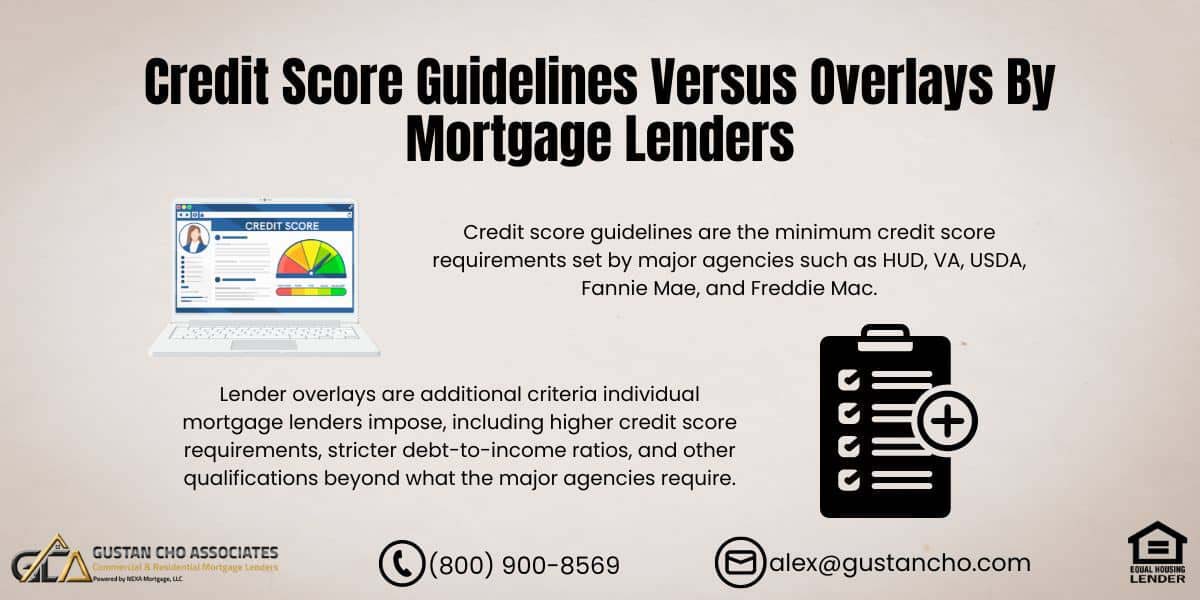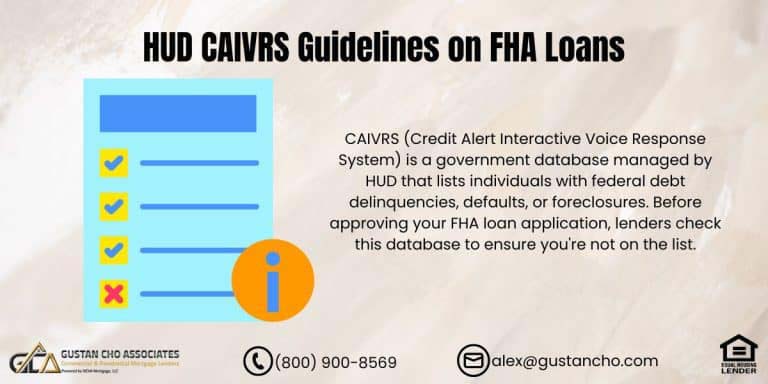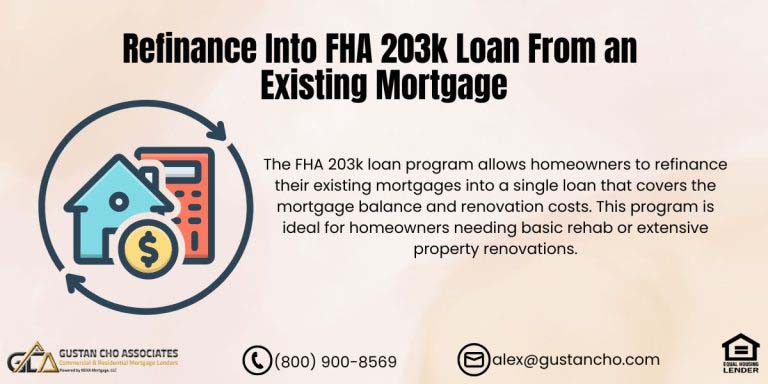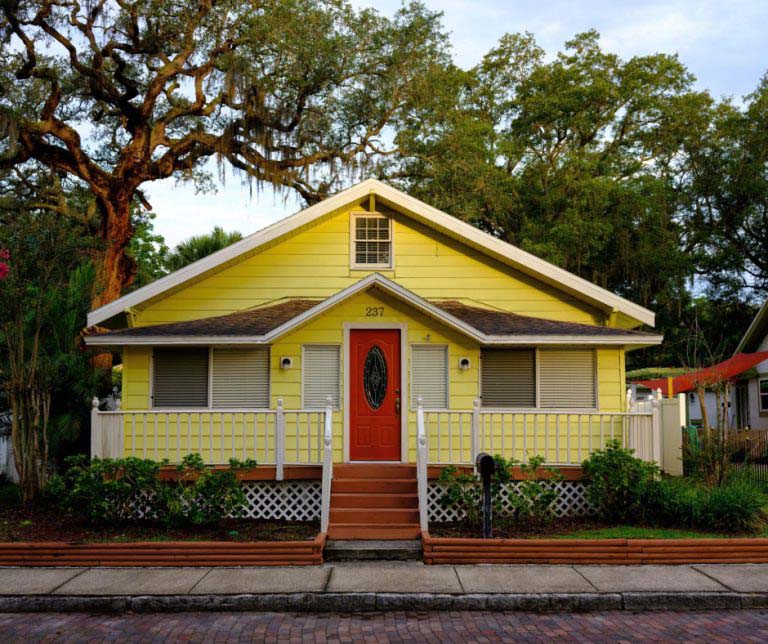This guide covers credit score guidelines versus overlays by mortgage lenders. There are two types of credit score requirements to get approved for a mortgage. There is the agency credit score guidelines by HUD, VA, USDA, Fannie Mae and Freddie Mac. The second credit score guidelines is from the individual mortgage lender.
Many borrowers are confused between credit score guidelines versus overlays by mortgage lenders on home loans. HUD, VA, USDA, Fannie Mae, Freddie Mac has not changed agency mortgage guidelines on credit score requirements.
Each lender has lender overlays which are lending requirements above and beyond the minimum agency mortgage guidelines. For example, VA loans does not have a minimum credit score requirement. However, lenders can have overlays on VA loans where they require a 620 credit score. The credit score the lender requires on VA loans is called lender overlays on VA loans. In the following paragraphs, we will cover credit score guidelines versus overlays on government and conventional loans.
How HUD Credit Score Guidelines Impact Down Payment on Home Purchase
HUD still requires a 3.5% down payment for a 3.5% down payment home purchase FHA loan. HUD allows borrowers with under 580 credit scores and down to a 500 FICO to qualify for FHA loans with a 10% down payment. The Veterans Administration still does not have a minimum credit score requirement to qualify for a VA loan
Fannie Mae and Freddie Mac still require a 620 credit score requirements on all conventional loans. However, why is it that lenders have increased minimum credit score requirements across the board?
Why are most lenders now requiring 660 to 680 credit scores on FHA and VA loans? Why are lenders charging historic high mortgage rates and discount points for borrowers with under 700 FICO? Why are loan level pricing adjustments so high when it comes to pricing hits? This is why understanding credit score guidelines versus overlays is important. The great news is Gustan Cho Associates has no lender overlays on credit scores on government and conventional loans. In the following paragraphs, we will cover credit score guidelines versus overlays by mortgage lenders.
Understanding Credit Score Guidelines Versus Overlays By Mortgage Lenders
All mortgage lenders need to make sure borrowers meet the minimum agency guidelines of HUD, VA, USDA, Fannie Mae, Freddie Mac. However, each lender has the right to set their own lending guidelines that are above and beyond of HUD, VA, USDA, Fannie Mae, Freddie Mac. These additional lending guidelines imposed by individual lenders are called lender overlays. Any lender can impose lender overlays on just about anything. Typical lender overlays are lender overlays on credit scores, debt to income ratios, gift funds, manual underwriting, seasoning requirements, collections, and other derogatory credit, and other credit requirements.
Confused by Credit Score Requirements? It Might Be a Lender Overlay.
FHA, VA, and USDA allow lower credit scores—but many lenders add their own rules. Apply With a No-Overlay Lender Today!
What Are Overlays Imposed By Mortgage Companies
Not all lenders have the same overlays. Some lenders may have overlays on credit scores while others may not. The coronavirus pandemic has created liquidity issues on the secondary mortgage bond market. This has created fear and uncertainty on investors who purchase mortgage-backed securities on the secondary mortgage bond market.
Besides credit score guidelines versus overlays, mortgage companies can add other lender overlays. Remember that not all lenders have the same lending requirements on government and conforming loans.
Due to these liquidity issues and uncertainty in the secondary mortgage bond market, most lenders increased credit score requirements on government and conventional loans. Most lenders increased credit score requirements to 660 to 680 FICO. This holds true even though HUD, VA, USDA, Fannie Mae, Freddie Mac has not changed their agency mortgage guidelines on credit scores.
Mortgage Forbearance Under The CARES Act
Included in the CARES Act are homeowners affected from the coronavirus pandemic to be eligible for forbearance. Any homeowners with a federally-backed mortgage and affected by financial hardship due to the COVID-19 pandemic are eligible for forbearance. Forbearance is not a loan modification.
Forbearance is different than loan modification. A loan modification is when you totally restructure the mortgage rates. Each loan modification can have restructuring of rates, terms, and repayment.
Forbearance allows borrowers to skip mortgage payments for a certain period of time. Once the forbearance period term is over, the borrower needs to pay the missed payments which include the escrow shortage. Lenders will spread the missed payments and escrow shortage over a period of time where the borrower can afford the repayment plan. Repayments of missed payments are normally interest-free. The forbearance does not hurt the borrower’s credit scores.
Waiting Period After Mortgage Forbearance
Borrowers have a three-year waiting period to qualify for a home purchase or refinance mortgage after the forbearance. Three timely mortgage payments need to be made after forbearance to qualify for another mortgage. Over 43 million Americans have filed unemployment claims in the past 9 weeks.
Forbearance does not necessarily require a long waiting period after the forbearance. Loan modifications can require a one year or longer waiting period for the borrower to qualify for a new home purchase or refinance mortgage loan.
The flood of forbearance requests to mortgage servicers is alarming and creating fear and uncertainty in the mortgage markets. The U.S. economy will recover. However, the key question is how long will it take for the economy to recover. The fear of lenders is if the number of forbearance requests is large, mortgage servicers still need to make payments to investors.
Mortgage Escrow Accounts
Servicers will also need to pay property taxes and insurance for borrowers with escrow accounts. If a substantial number of the 43 million Americans who filed unemployment claims apply for forbearance, this can bankrupt lenders unless there is a bailout by the federal government for mortgage servicers. This is the main reason why lenders do not want to take on risk in taking mortgage applications on risky lower credit borrowers.
Understanding Credit Score Guidelines Versus Overlays During The Covid-19 Outbreak
Many borrowers are getting conflicting answers when qualifying for a mortgage. There are countless of borrowers who were pre-approved prior to the coronavirus pandemic whose pre-approval is now null and void. This is because most lenders have tightened their credit score requirements. Most lenders now require a 660 to 680 credit score requirement as part of their lender overlays. Many strong able homebuyers with under 660 credit scores are left without a lender to obtain a mortgage. Not all lenders have the same credit score requirements. Some lenders may require a 680 credit score while others may take borrowers with a 620 credit score. If you are told you do not qualify for a mortgage due to not meeting a lender’s credit score requirements, go to a different lender.
Denied for Low Credit? It May Not Be the Guidelines—It’s the Lender.
Most lenders impose overlays. We don’t. Get a Second Opinion—See If You Really Qualify!
Mortgage Lenders With No Overlays on Government and Conventional Loans
The great news is Gustan Cho Associates Mortgage Group has no lender overlays on government and conventional loans during the COVID-19 pandemic. Gustan Cho Associates still take borrowers with under 620 credit scores. We go down to 500 FICO on FHA loans.
Gustan Cho Associates and its subsidiary mortgage companies dos not have a minimum credit score requirement on VA loans as long as they can get an approve/eligible per automated underwriting system (AUS).
Gustan Cho Associates still do FHA and VA manual underwriting during the coronavirus pandemic while most lenders have stopped doing so. If you need a lender with no lender overlays on government and conventional loans during the COVID-19 pandemic, please contact us at Gustan Cho Associates at 800-900-8569 or text us for a faster response. Or email us at gcho@gustancho.com. The team at Gustan Cho Associates are available 7 days a week, evenings, weekends, and holidays.
FAQ About Credit Score Guidelines Versus Overlays By Mortgage Lenders
- 1. What are credit score guidelines and lender overlays? Credit score guidelines are the minimum credit score requirements set by major agencies such as HUD, VA, USDA, Fannie Mae, and Freddie Mac. Lender overlays are additional criteria individual mortgage lenders impose, including higher credit score requirements, stricter debt-to-income ratios, and other qualifications beyond what the major agencies require.
- 2. Why do lenders implement overlays? Lenders implement overlays to manage their risk. Factors like market uncertainty, changes in the secondary mortgage bond market, and overall economic conditions can prompt lenders to add overlays to ensure that loans are made to borrowers more likely to repay them.
- 3. What changes have occurred in credit score requirements due to the COVID-19 pandemic? Many lenders have increased their minimum credit score requirements from the standard guidelines set by agencies. For instance, while HUD and the VA do not necessarily require high scores, many lenders have adjusted their minimum credit score requirement to 660-680 for FHA and VA loans during the pandemic.
- 4. What is mortgage forbearance under the CARES Act? If you are a homeowner facing financial difficulties due to the COVID-19 pandemic, you may be eligible to apply for mortgage forbearance under the CARES Act. This provision enables homeowners to temporarily suspend their mortgage payments for a specific duration. This forbearance is interest-free and does not impact the borrower’s credit score.
- 5. What happens after mortgage forbearance ends? After the forbearance period, borrowers must repay the missed payments, which may include an escrow shortage. These payments are typically spread out over time to make repayment manageable. After completing forbearance, there is also a three-year waiting period to qualify for a new mortgage.
- 6. How do I find a lender if I have a lower credit score? Not all lenders have the same overlays. Suppose one lender denies a mortgage application due to a low credit score. Finding another lender with less stringent requirements may be possible. Gustan Cho Associates accepts certain FHA loans with scores as low as 500.
- 7. What should I do if I was pre-approved for a mortgage before the pandemic but now do not qualify? Market conditions and lender criteria can change, especially in uncertain times like during the COVID-19 pandemic. Suppose a pre-approval has become void due to tightened credit score requirements. In that case, shopping around and checking with other lenders with different or no overlays, like Gustan Cho Associates, is advisable.
- 8. What are the standard credit score requirements by major agencies?
- HUD: Requires a minimum 500 FICO score for FHA loans with a 10% down payment.
- A: No minimum credit score requirement, but lenders might set their own.
- USDA, Fannie Mae, and Freddie Mac Generally require a minimum credit score of 620 for conventional loans.
- 9. Why are lenders charging higher rates and points for lower credit scores? Borrowers with low credit scores may face higher rates and points from lenders as compensation for the potential risk of default. If their credit score is below 700, they will usually face higher loan-level pricing adjustments.
- 10. Can I still get a mortgage with a credit score under 620 during the COVID-19 pandemic? Even amid the pandemic, lenders such as Gustan Cho Associates continue to offer mortgages to borrowers with lower credit scores. They offer FHA and VA loans without credit score overlays, which means applications with scores as low as 500 are accepted.
Overlays vs. Guidelines—Know the Truth Before You Give Up.
Just because one lender said no, doesn’t mean you can’t buy a home. Check Your Loan Options With No Overlays Now!










